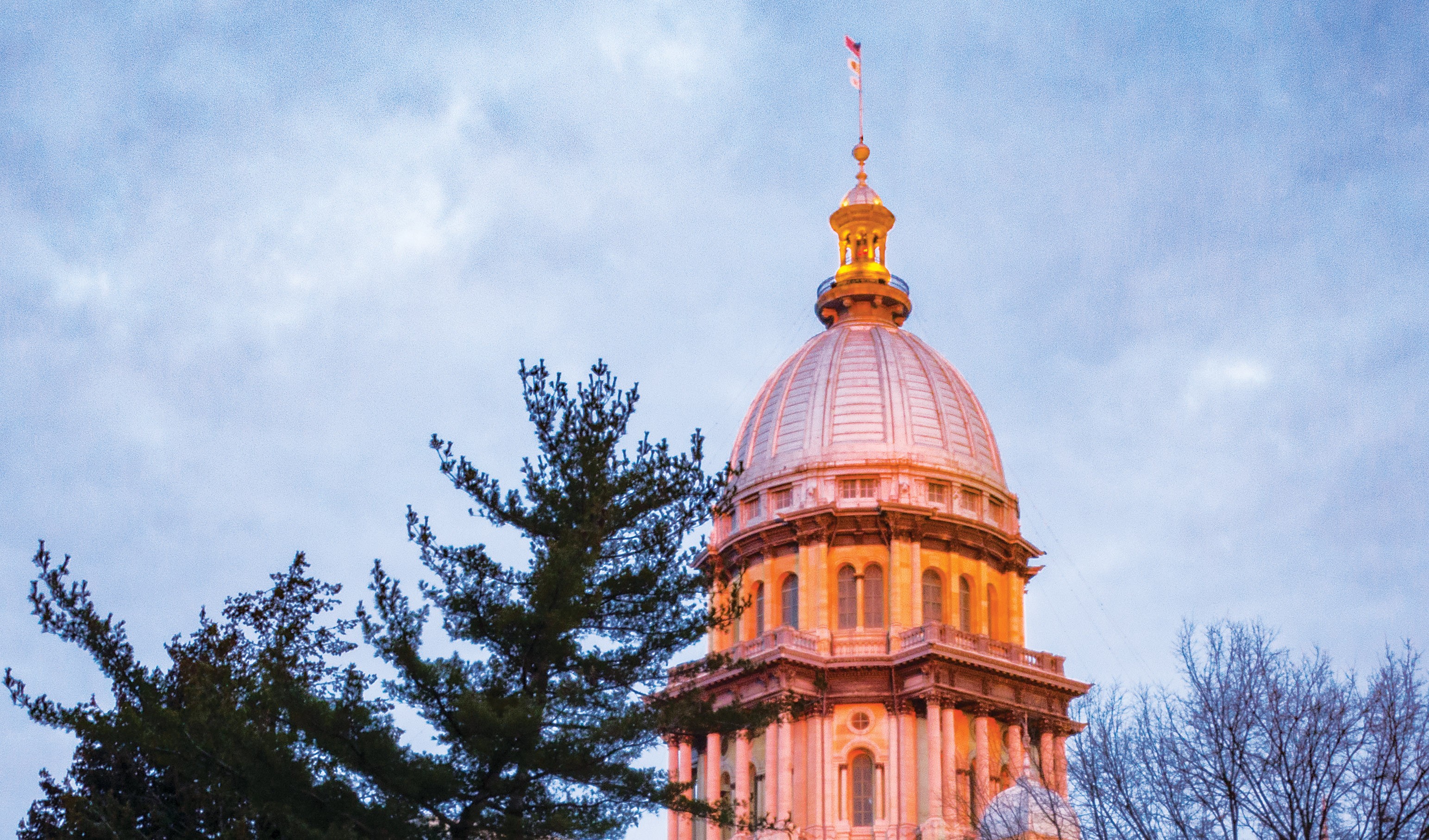Minutes after the Senate put the final touches on first-term Democratic Gov. J.B. Pritzker’s sweeping legislative agenda Sunday, June 2, the governor addressed media and delivered a message: “Illinois is back.”
“Today, the people of Illinois can be proud that we are putting state government back on the side of working families,” Pritzker said at the news conference. “They can be proud that we are restoring fiscal responsibility after many years of crisis and deficits.”
“This has been an extraordinarily productive session of the General Assembly. Simply historic,” House Speaker Michael Madigan, D-Chicago, said just before the House adjourned.
Pritzker stood beside Senate Minority Leader Bill Brady, a Bloomington Republican, and several senators of both parties as he addressed the media in his office after receiving overwhelming bipartisan approval on several key measures.
“Throughout this session, Senate Republicans were not afraid to speak up when needed, and were not afraid to stand together when warranted,” Brady said in a statement. “I commend Governor Pritzker for working across the aisle on those key issues that produced bipartisan support. Now, as we move forward, Senate Republicans will continue to fight for the issues important to Illinois residents.”
Pritzker touted the bipartisan process and the working groups that negotiated the budget behind closed doors. The 1,500-page document was released publicly just 12 hours before it was approved.
Legislative leaders from both parties called the $40 billion operating budget a balanced, responsible state funding effort, and Republicans emphasized the inclusion of several pro-business reforms and tax incentives that were added to the package upon their request.
Those measures include tax incentives aimed at enticing data centers to locate in Illinois, eliminating reporting of the retailers’ discount in the comptroller’s tax expenditure report, eliminating the franchise tax, reinstating the manufacturers’ purchase credit, and a “Blue Collar Jobs Act to help attract large-scale projects.”
While the passage of the budget itself gave Pritzker a major victory, it often seemed an afterthought as the General Assembly passed a slew of other hot-button issues.
Those include a $45 billion capital infrastructure plan for road, bridge, building and broadband internet projects, a massive gambling expansion, legalization of recreational marijuana, a reproductive rights expansion bill, a graduated tax constitutional amendment and a minimum wage increase.
The infrastructure plan is the first in more than 10 years and is made possible by revenues expected to come from sports betting licenses, a $1 increase to the state’s cigarette tax and a doubling of the state’s motor fuel tax to 38 cents from 19 cents, along with increased driver’s license fees.
Upon adjournment, Pritzker said he will work to ensure new policies are implemented correctly before returning for the fall veto session and the second legislative session of his first term.
“Make no mistake. We still have a lot of work ahead,” he said. “Our budget and pension challenges unfolded over many years, and they won’t go away overnight. We have more big things to do – to bring more efficiencies to state government, to grow our economy at a faster rate, to create jobs, to invest in our future.”
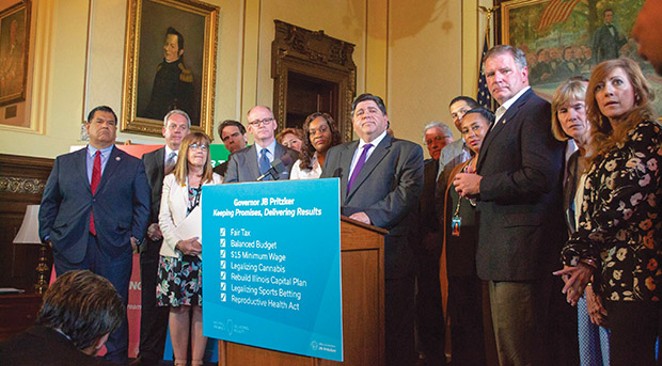
Six new casinos, along with legalized sports betting, are coming to Illinois after Senate lawmakers approved a massive gambling expansion bill Sunday, June 2.
Senate Bill 690, sponsored by Indian Creek Democratic Sen. Terry Link, passed that chamber on a 46-10 vote after being approved by House lawmakers the day before. Gov. J.B. Pritzker has already announced his intention to sign it into law.
“I’ve only been doing this for 20 years to get this done, and it’s a little emotional,” said a teary-eyed Link during floor discussion of the bill.
Link estimated that gambling expansion, along with other revenue-raising measures in the bill, could net Illinois more than $12 billion in the next six years.
“This key piece of legislation really is going to make an economic difference of keeping our dollars home,” he said, adding he expects “thousands of jobs and billions of dollars in construction across the state.”
That construction would go toward the six new casinos authorized by the bill – in Waukegan, Rockford, Danville, South Suburbs, Williamson County and downtown Chicago.
Casinos, racetracks and sports facilities that seat more than 17,000 people – such as Wrigley Field or United Center – would also be eligible to buy sports betting licenses under the bill, making Illinois one of about a dozen states to legalize the practice after a U.S. Supreme Court ruling last year allowed it.
Revenues raised from the new casinos, the selling of sports betting licenses, and a higher tax on video gambling machines would go toward funding the vertical components of a long-term capital infrastructure plan, such as state building renovations. Sports betting licenses would range from $3.2 million to $20 million and be offered to both brick-and-mortar facilities and to online operators, with taxes of 15 percent.
Under the bill, racetracks in the state would be able to install slot machines and table games, turning them into racinos. A pilot program will also assess sports betting through the Illinois Lottery, a plan that was considered but dropped by lawmakers earlier in the session.
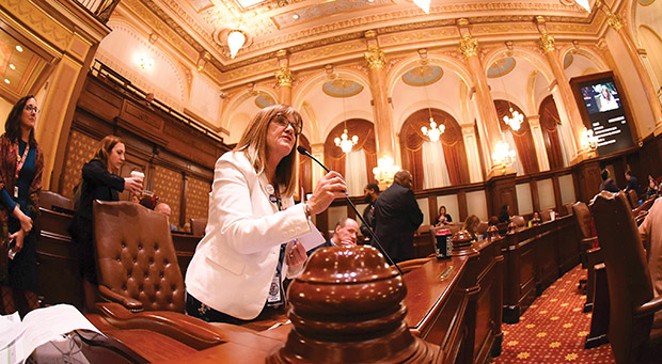
Budget and capital plan
The Illinois House closed out what was perhaps the most monumental legislative sessions in recent memory Saturday, June 1, after passing the final pieces of a budget for the upcoming year and a $45 billion capital improvements program that will be partially funded by expanded gambling.
Saturday’s action in the House effectively marked the end of an intense competition between Democratic and Republican leaders that had threatened to send lawmakers into extended overtime.
The final 48 hours were marked by heated discussions and intense negotiations between Democrats and Republicans and a constant flurry of back-door meetings with House and Senate caucus leaders and Democratic Gov. J.B. Pritzker.
Although Democrats hold supermajorities in both chambers, Republican votes were needed on some key measures to get them over the finish line, especially after the session stretched into June 1, which triggered a constitutional requirement that bills taking immediate effect receive three-fifths majorities in both chambers – 71 votes in the House and 36 votes in the Senate.
But Republicans held out because they wanted Democrats to agree to a number of pro-business initiatives that included tax incentives for businesses hiring construction workers for major projects, other incentives for developing high-tech data centers and phasing out the franchise tax, to name a few.
When Democrats finally agreed to those measures, the final pieces of the budget package fell into place with broad bipartisan support.
One of the pieces needed to make the budget work was a revenue bill, Senate Bill 689, which included, among other things, a new tax on Medicaid managed care organizations that will allow the state to draw down additional federal matching funds, freeing up about $390 million in general revenue funds for other purposes. It passed by a vote of 107-to-9.
Another was what’s known as a “budget implementation bill,” Senate Bill 1814, that spells out specifically how money appropriated to various agencies is to be spent. That bill includes pay increases for home care providers who deliver home and community-based services to the elderly and disabled. It passed by a vote of 97-17.
The final piece was House Bill 142 authorizing the state to issue $1.7 billion in bonds, the proceeds of which will be used to pay down the state’s backlog of unpaid invoices, a measure that is expected to save the state hundreds of millions of dollars a year in interest costs.
The General Assembly approved a $40 billion fiscal year 2020 state operating budget Friday night, May 31, pushing further action on a host of other issues to an impromptu Saturday morning session.
The legislative leaders of each chamber had several meetings with Democratic Gov. J.B. Pritzker throughout the day Friday as House Republicans withheld their votes while seeking concessions from Democrats.
At 1 p.m., Deputy House Minority Leader Tom Demmer, a Dixon Republican, released a statement saying Democrats “withheld information, added additional taxes and rejected any attempts to grow our economy.”
By 9:45 p.m., Demmer was speaking on the floor about the balanced budget proposal that was a product of compromise. A flurry of closed-door meetings filled the eight hours in between.
While only three speakers from each party were allowed to address the matter on the floor per an agreement between House leaders, discussion lasted about 20 minutes and the vote passed 83-35.
House Majority Leader Gregory Harris, a Chicago Democrat, extolled the budget as one that funds higher education and K-12 schools while making full pension payments and contributing $1.4 billion to paying down part of the state’s backlog of unpaid bills.
He said $1.2 billion of the backlog payments would be funded by bond borrowing and another $200 million would be funded by an anticipated budget surplus. He said paying down debts will save 12 percent daily interest on some of the oldest bills, saving hundreds of millions of dollars in the long run.
Minority Leader Jim Durkin, a Western Springs Republican, called the budget “a start” to progress in Illinois that is “fair” to taxpayers and businesses.
The General Revenue Fund spending in the fiscal year 2020 budget is estimated at $39.9 billion. An added $600 million in supplemental spending for fiscal year 2019, most of which will go to paying back pay for step increases to state employee salaries that former Republican Gov. Bruce Rauner withheld, would bring the total to about $40.6 billion.
The budget includes $375 million in added state funding for K-12 education, $25 million more than is mandated by the state’s evidence-based funding formula. It also increases mandated categorical funding for K-12 education by $47.3 million, bringing expenditures in that area to $928.8 million.
Funding for early childhood education would increase by $50 million, up to $543.7 million.
Higher education will see an increase of $134 million over fiscal year 2019 levels, increasing to $1.94 billion. The increase would include $50 million more than last year for Monetary Award Grant funding and 5 percent increases to state university and college operations.
The Department of Human Services, the Department on Aging, and the Department of Children and Family Services would all see rate increases to cover the state’s increase to the minimum wage. Overall, human service departments would see an increase of $567 million from last year’s budget.
General revenue funding for DCFS would increase by $89 million from fiscal year 2019, bringing the total up to $845 million.
The capital improvements program also consisted of a package of three bills.
House Bill 62 spells out how the $45 billion will be spent. It calls for $33.2 billion, or about 74 percent of the total, to be spent on roads and bridges, what lawmakers refer to as “horizontal” infrastructure. Another $3.5 billion, or 8 percent of the total, would be spent on K-12 and higher education facilities.
The remainder would be divided between state facilities, environmental conservation projects, deployment of broadband internet, and health care and human service facilities.
The other two bills provide the funding for those projects.
Senate Bill 1939 provides funding for the horizontal projects through a combination of a 19-cent per gallon increase in the state gasoline tax, increases in vehicle registration fees, especially for electric vehicles, plus a variety of other miscellaneous fees. It passed the House, 83-29.
And House Bill 690 provides funding for the “vertical” infrastructure projects. It includes legalized sports betting and expansion of casino gambling, a $1 per pack increase in cigarette taxes, new taxes on parking fees, and extending the state sales tax to purchases made remotely, including online purchases from out-of-state retailers that do not have a brick-and-mortar nexus in Illinois. It passed the House, 87-27.
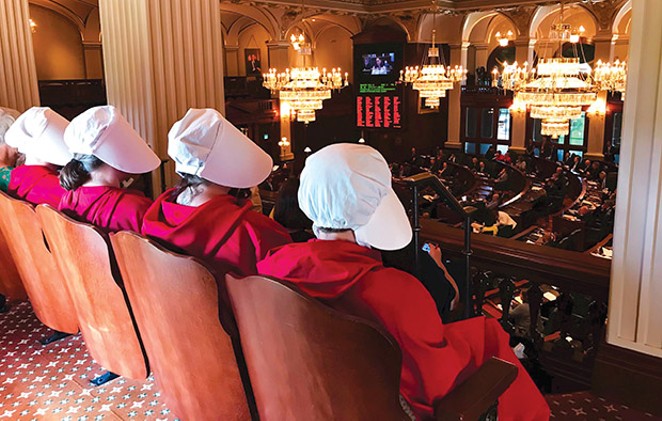
Abortion bill
Legislation that backers and detractors agree will be the most liberal reproductive health statute in the country went to the governor’s desk after about 80 minutes of impassioned debate by the Illinois Senate late Friday night, May 31.
The abortion repeal-and-replace measure was a source of controversy this session. From its introduction in February, the Reproductive Health Act drew calls of support from advocates looking to the General Assembly to respond to restrictions enacted by some states across the country, and those of warning from opponents concerned about protections being struck from current law.
Sen. Melinda Bush, a Democrat from Grayslake and the bill’s sponsor in that chamber, said she hopes passage of the legislation will make the state “a beacon for the country.”
“I’m so proud that Illinois is standing up and saying, we’re not going back, we’re going to continue to fight and we’re going to make sure that women are equal here. Their reproductive rights are part of that,” she said.
In a statement, Democratic Gov. J.B. Pritzker said he will sign the measure.
“In Illinois, we trust women to make the most personal and fundamental decisions of their lives – and now, that will be the law of the land, even as it’s under threat in other states,” he said.
The measure received 34 Democratic yes votes. Twenty senators voted no, including lone Democrat, Bunker Hill Democrat Andy Manar. Three Democrats voted present.
The measure, Bush said, “codified current practices” and repealed parts of Illinois law enjoined by courts.
Sen. Dan McConchie, a Republican from Hawthorn Woods, said if that was all the bill aimed to achieve, it would be one page – not 126.
McConchie sought clarification on whether any provisions of the legislation would render toothless the Parental Notification of Abortion Law, which requires a minor to consult her parents before getting the procedure. Bush said no part of her bill would impact that statute.
“This proposal leaves me stunned,” McConchie said. “For anyone who wants abortions to be legal and safe, this bill will do exactly the opposite.”
Republican Sen. Jil Tracy, from Quincy, called the bill “extreme.”
“It goes far beyond the current practice in Illinois. It has provisions that could endanger rather than protect a pregnant woman and it’s not needed under current Illinois law or federal law,” she said. “Once again in Illinois, we are passing bills looking to solve a problem that doesn’t exist.”
Illinois’ dioceses have condemned the General Assembly’s passage of the abortion repeal-and-replace measure.
Cardinal Blase Cupich, head of Chicago’s archdiocese, said in a statement June 1 that the act’s passage “marks a sad moment in our history as a state.”
Joliet diocese Bishop R. Daniel Conlon called the Reproductive Health Act a “horrific piece of legislation.” Rockford diocese Bishop David Malloy called it “horribly misnamed,” and Springfield diocese Bishop Thomas John Paprocki said in a statement lawmakers passed the bill in a “gravely immoral action.”
Graduated income tax
A constitutional amendment that would allow the General Assembly to set higher tax rates on greater amounts of income passed its last legislative hurdle Monday, May 27, and will head to the voters for final approval about 18 months from now.
After more than three hours of debate in which all 44 House Republicans spoke on the floor, the vote cleared its constitutionally mandated three-fifths majority by two votes. All 73 representatives voting in favor were Democrats.
While Democratic Gov. J.B. Pritzker played no formal role in the legislative process to put the amendment on the ballot, at least one Democrat who previously said he would vote against the bill credited the governor for his sudden switch.
“I was a very vocal critic about this, obviously, I came out with some concerns,” Rep. Jonathan Carroll, a Northbrook Democrat, said. “… Gov. Pritzker reached out to me right away, had some conversations with me and heard that my issue is property taxes.
“Along with his help and the help of my colleagues in the House and the Senate, we’re going to form a property tax task force to review how we tax in Illinois for property taxes and make sure that we do it better and we do it right.”
The state does not levy or collect property taxes in Illinois; only local taxing bodies such as school boards, municipal governments and counties have that authority. The largest contributor to most local tax bills are K-12 schools, which for years have faced funding shortfalls and proration from insufficient revenues provided by the state.
Still, Carroll and Rep. Sam Yingling – a Grayslake Democrat who also said at one time he would vote against the graduated tax – said state action is needed to overhaul the property tax system and the graduated tax is part of that process.
“The current system does not work and we all know that,” Yingling said in his floor speech. “The process of property tax restructuring will not be easy. But I submit that that process begins today.”
Republicans, however, were more skeptical of any actual tax relief coming from the bill, and House Minority Leader Jim Durkin, R-Western Springs, accused the governor of “horse trading” in order to get the 73 votes in favor.
“Let’s make no mistake. Today’s vote is the end result of the Illinois Democrats’ historical, ravenous, irresponsible budgeting and spending,” Durkin said. “However it was also clear that today’s vote was a fait accompli. It’s a foregone conclusion.”
Passage of Senate Joint Resolution Constitutional Amendment 1 passage means the voters, in November 2020, will be given the opportunity to decide whether the state can have the authority to set graduated tax rates. Either 60 percent of those voting on the question or the majority of those voting in the election will have to support the measure for it to become law.
Conditional graduated tax rates passed the General Assembly on Friday, May 31, and will head to the governor.
The graduated tax rate structure will take effect in January 2021 only if voters approve the constitutional amendment on the November 2020 general election ballot. The Senate’s vote Friday was a procedural concurrence with a minor House amendment.
Per the rate structure, single filers would pay the maximum rate of 7.99 percent on all income once their taxable income tops $750,000. For joint filers, that rate takes effect on all income when it exceeds $1 million.
For the rest of the brackets, each varying tax rate would apply to only one specific margin of income.
The rates are 4.75 percent on taxable income from $0 to $10,000; 4.9 percent from $10,001 to $100,000; 4.95 percent from $100,001 to $250,000; 7.75 percent from $250,001 to $500,000; and 7.85 percent from $500,001 to $1 million.
For single filers, tax rates are the same as joint filers up to $250,000; but the 7.75 percent rate applies from $250,001 to only $350,000, while the 7.85 percent rate applies from $350,001 to $750,000.
The bill also includes an increase in the property tax credit from 5 percent to 6 percent, and up to a $100 per-child tax credit for couples earning less than $100,000 and single persons earning less than $80,000.
The corporate tax rate would go from 7 to 7.99 percent, not including an existing corporate property replacement tax of 1.5 to 2.5 percent that is not changed by the bill.
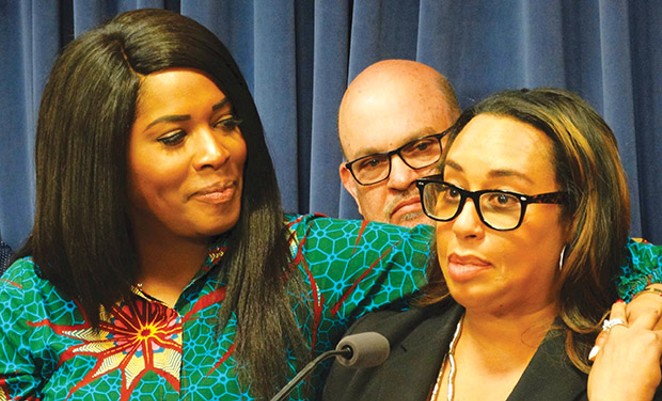
Legalized marijuana
Legalized recreational marijuana was approved and sent to the governor’s desk. By all indications Pritzker will sign it.
In the first legislative action in the Illinois House of what had been scheduled as the last day of the session, Senate Bill 1438 passed on a 66-47 vote after more than three hours of debate Friday, May 31.
Marijuana legalization was one of Gov. J.B. Pritzker’s marquee campaign points.
Once the governor signs the bill, the goal will be to have marijuana available to consumers by Jan. 1, 2020. Per the bill, Illinois residents could possess up to 30 grams, or roughly one ounce, of marijuana flower, five grams of THC concentrate and five grams of THC in a marijuana-infused product.
The bill authorizes the state to issue a limited number of licenses for cultivators, processors and retail dispensaries, and to charge excise taxes on the retail sale of marijuana products.
Medicinal marijuana patients would be allowed to grow up to five cannabis plants in their home.
The bill also allows for expungement through the governor’s clemency process if the case involves less than 30 grams of marijuana. For cases involving amounts greater than that, up to 500 grams, individuals and state’s attorneys would be allowed to petition a court to vacate a conviction.
The Senate passed the bill May 29. The vote was 38-17, with two Republicans joining 36 Democrats in supporting it.
“This bill is going to set the model, I believe, the gold standard for how to approach social equity issues, relating to cannabis legalization,” Sen. Heather Steans, D-Chicago, the bill’s chief sponsor, said in her closing statement on the Senate floor.
The Senate on Sunday, June 2, voted to permanently legalize medical marijuana in Illinois. The House OK’d the measure the previous day.
Lawmakers approved a pilot program for medical marijuana legalization in 2013 that is set to expire next year.
Rep. Bob Morgan, a Deerfield Democrat, said Senate Bill 2023 stabilizes the program, clarifies who can be certified patients, and adds a social equity component. The bill also adds 11 new qualifying conditions, including chronic pain, migraines, anorexia and irritable bowel syndrome.
“There are tens of thousands of patients in Illinois that are relying on us to get this done, to stabilize and continue and extend this program for them,” Morgan said from the House floor Saturday evening.
Cigarette tax
A pack of cigarettes will cost an extra dollar in Illinois after the Senate on June 2, approved a bill passed a day earlier by the House.
Buried on page 170 of an 800-page bill providing funds for vertical infrastructure projects is a usage tax increase on cigarettes and a new tax on e-cigarettes.
The language increases the state’s current $1.98 per-pack cigarette tax by $1, and is expected to generate about $159 million in revenue per year, according to advocates. That new money will go toward capital projects including building construction, land acquisition and utilities improvements.
In his February budget outline, Democratic Gov. J.B. Pritzker proposed increasing the usage tax on cigarettes by only 32 cents, about one third of the amount approved by the House Saturday.
The legislation also incorporates the initiative of Sen. Terry Link, a Democrat from Indian Creek, to include electronic cigarettes – such as e-cigars, vapes or hookahs – in the state’s definition of a tobacco product so Illinois can charge a usage tax on them too.
That tax is set at 15 percent of the wholesale price of such products. It is unclear how much revenue will be generated, advocates say, because there is no regulation on that classification of goods.
The new taxes on both cigarettes and electronic cigarettes will take effect July 1, 2019.
Workplace harassment
All businesses in the state would need to provide workplace sexual harassment training to employees under a robust bill approved by the Senate on June 2, and the House a day earlier.
Senate Bill 75, carried by Sen. Melinda Bush, D-Grayslake, requires all employers to provide workplace sexual harassment training at least once a year and advises workers on steps they can take after reporting incidents of harassment or discrimination.
The bill extends to the private sector many of the same increased workplace protections of a 2018 bill addressing sexual harassment policy in the legislature.
Rep. Ann Williams, a Chicago Democrat who carried SB 75 in the House, said the legislation is the “next step in a series of bills” to strengthen workplace protections regarding sexual harassment statewide.
Under the new bill, failure to train employees could result in a $500 penalty to businesses with fewer than four workers, or a $1,000 penalty to those with four or more.
FOID overhaul
Rep. Kathleen Willis said she was “extremely disappointed the Senate chose not to call” her bill to increase Firearm Owner’s Identification card fees and mandate fingerprinting before the end of session.
Willis, a Democrat from Addison, said she remains committed to working on the bill over the summer with hopes of reviving it during the fall veto session, a brief two-week period in November when lawmakers return to the Capitol.
“I always find bills can find ways to be better,” Willis said.
Under Willis’ proposal, both new applications for FOID cards and five-year card renewals would cost $20, up from the current cost of $10. The fees would have gone toward law enforcement revocation efforts.
Scott’s law
Since the start of 2019, 22 Illinois State Police troopers have had their patrol vehicles struck by drivers who’ve disobeyed Scott’s Law. With Senate Bill 1862 passing both chambers, violators will now receive steeper fines.
The piece cleared the Senate Thursday evening, May 30, and in a news release on Friday, May 31, Gov. J.B. Pritzker commended the bipartisan effort behind the bill and said he looks forward to signing the legislation.
“Our state troopers and emergency responders risk their lives to protect us, and I applaud the General Assembly for taking action to help keep them safe.” Pritzker said in the statement.
Drivers who fail to reduce their speed or move over when approaching stationary vehicles on the side of the road could be fined at least $500 for a first offense. The fine and fee increases to at least $1,000 for repeat offenses. The maximum fine for any offense is $10,000.
The law also increases the severity of violations that result in the death or harm to a first responder from a class 3 felony to a class 2 felony.
Money collected from Scott’s Law violations, $250 per fine, will go into a Scott’s Law Fund to produce driver education materials.
A second bill, Senate Bill 2038, creates the Move Over Task Force to study why violations persist and places a single test question on driving exams regarding the action that should be taken when approaching stationary vehicles.
Property taxes
A pair of bills aimed at addressing Illinois’ high property tax costs passed the General Assembly on Friday, May 31, and will head to the governor.
The property tax bills became part of the conversation this session at the request of several “swing” votes on the constitutional amendment, and were backed by Democratic Gov. J.B. Pritzker.
One bill, Senate Bill 39, will establish a “property tax relief fund,” which would be used to pay refunds to Illinois property taxpayers, but it would be subject to the appropriations of future General Assemblies and would not take effect until January 2021.
It passed the House 98-16 Thursday night with one voting present, and it passed the Senate 56-0 with one present vote Friday.
“This bill will create a mechanism that will allow the General Assembly to provide direct property tax relief to every single homeowner in the state of Illinois,” Rep. Daniel Didech, a Buffalo Grove Democrat and the bill’s House sponsor, said.
Didech said a property tax task force will meet this summer in an effort to identify revenues for the fund and find other ways to provide property tax relief, and the General Assembly will decide on revenues in the future.
Alternative energy providers
The Illinois House May 30 passed a bill backed by the state’s attorney general, that would enact greater regulation of alternative retail energy suppliers, many of which go door-to-door using “deceptive practices” to lock consumers into contracts that ultimately lead to higher energy costs.
In a unanimous vote, the House passed Senate Bill 651, the Home Energy Affordability Transparency, or HEAT Act, sending it back to the Senate. That chamber passed the bill 43-10 on May 1, then agreed with a minor amendment to send it to Gov. J.B. Pritzker’s desk.
The bill was an initiative of Attorney General Kwame Raoul, who said at a news event last month “almost nobody” who signs up to receive gas or electricity from alternative energy providers ends up paying less for their energy bills than consumers who stayed with their public utility.
“Energy suppliers rely on sales gimmicks and misleading sales pitches in order to lure consumers into high-priced energy contracts, and the HEAT Act will force suppliers to change the way they do business,” Raoul said in a release Thursday after the bill’s passage.
The bill was sponsored in the House by Rep. Jehan Gordon-Booth, a Peoria Democrat, who said it will protect against “misleading and deceptive, fraudulent claims” by door-to-door energy salespeople.
If the bill becomes law, alternative suppliers would be required to provide consumers with information about rates, fees and early termination charges, and they would be required to obtain consumers’ express consent before the contract is switched from a fixed rate to a variable rate.
Suppliers would also be required to notify customers before their rates rise, and would be prevented from automatically renewing a consumer’s contract without their knowledge. They would also be required to report their rates to the Illinois Commerce Commission and the attorney general’s office.
Defining consent
A bill making school districts that teach sex education give a fuller definition of sexual consent is on its way to the governor to be signed into law.
House Bill 3550, sponsored in the House by Democrat Ann Williams, of Chicago, and in the Senate by Majority Leader Kimberly Lightford, of Maywood, passed unanimously out of the Senate on Wednesday, May 29, after being approved by House lawmakers in early April.
School districts that don’t opt out of teaching sex ed must follow a curriculum that includes abstinence, contraceptive methods and discussions of consent. Consent, however, is given no definition under the law, which says only that schools must provide a “discussion on what constitutes it.”
“Consent is not just a matter of yes and no,” Rep. Williams said in House debate on the matter in April. “Consent is a very complex subject that needs to be explored in a comprehensive way. It is so much more than just saying no means no.”
The fuller definition provided in the law includes, among other things, that “consent is a freely given agreement to sexual activity;” that “consent to one ... sexual activity does not constitute consent” to another; that “lack of verbal or physical resistance,” nor a person’s “manner of dress,” does not mean consent; and that a person cannot consent if they “can’t understand the nature of the activity” due to the effects of drugs or alcohol.
Teacher shortage
A pair of bills aiming to address the state’s teacher shortage passed the Illinois Senate on Wednesday, May 29.
Both bills were sponsored by Sen. Andy Manar, a Bunker Hill Democrat.
The first, House Bill 2078, raises the minimum wage for teachers to $40,000 by the 2023-2024 school year. The wage increase would be phased in, starting with a $32,076 minimum in the 2020-2021 school year, $34,576 the year after that, and $37,076 in 2022-2023. After 2024, the minimum wage will increase with the consumer price index each year.
The state’s current minimum teacher salary law of $10,000 has been unchanged since the 1980s.
The bill also directs a professional review panel – established as part of an education funding overhaul in the previous General Assembly – to report on how the evidence-based funding model will be affected by the increased costs incurred by districts as part of the minimum wage increase. Manar said the panel will look for ways the state can “bridge the gap” on increased costs for those districts.
The Senate also passed and sent to Pritzker a bill intended to address the state’s teacher shortage.
Senate Bill 1952 would eliminate the current requirement that prospective teachers take a “test of basic skills” prior to the start of their student teaching. It also allows for new teachers, under certain conditions, to be reimbursed for the cost of taking a teacher performance test, known as the edTPA exam.
It also removes a current prohibition against student teachers being paid for their work.
Coal ash
A bill aiming to ensure safe closure of toxic coal ash pits and financial protections for taxpayers should the pits cause environmental disaster is on its way to the governor.
Senate Bill 9 passed the Illinois House on May 27, 18 days after passing the Senate.
“This bill will set the parameters of how coal ash will be handled in the state of Illinois,” Democratic Rep. Carol Ammons of Urbana said.
Coal ash is the byproduct left behind when coal is burned to produce power, and it contains harmful heavy metals such as mercury and arsenic which can seep into groundwater. In many cases, coal ash is placed in unlined pits, where it remains long after the power plants are closed.
There are approximately 25 known coal ash impoundments which are already closed in the state. Senate Bill 9 would establish processes to address the other 50-plus impoundment sites which have yet to close.
The bill would require a coal ash impoundment owner to submit to the EPA a “closure alternatives analysis” addressing several closure scenarios and options laid out in the legislation. It would give the EPA the authority to choose the safest plan for coal ash remediation.
Senate Bill 9 would also create initial fees of $50,000 for each closed coal ash plant and $75,000 for those that have not yet been closed. Owners of operational impoundments would then pay an annual fee of $25,000, and a $15,000 fee would be charged for closed plants that had not yet completed “post-closure care.”
Coal ash impoundment owners would also be required to provide bonds ensuring closure and remediation of coal ash pits. Per the bill, the only acceptable form of bond would include “a trust fund, a surety bond guaranteeing payment, a surety bond guaranteeing performance, or an irrevocable letter of credit.”
Immigration policy
The Illinois House on May 27, and the Senate on May 30, passed a bill that would prohibit local governments and local law enforcement agencies from entering into certain kinds of agreements with U.S. Immigration and Customs Enforcement, or ICE, to enforce federal immigration laws.
House Bill 1637, known as the Keep Illinois Families Together Act, would prohibit state and local law enforcement agencies from participating in ICE’s “287(g) program.” The name comes from a 1996 addition to the federal Immigration and Nationality Act that allows local law enforcement to be deputized into federal service to help identify, arrest and serve detainer warrants on foreign-born individuals with criminal charges or convictions.
“These types of programs have been well documented and recorded as injecting bias and ethnic stereotyping into policing practices,” said Rep. Celina Villanueva, D-Chicago, who carried the bill on the House floor. “Because of this, and despite many protective policies in place in our state, families continue to be afraid to seek police protection. This is a huge public safety issue.”
Some Republicans spoke against the bill, including Rep. Allen Skillicorn, of East Dundee, who called it, “full-on sanctuary.”
“First off, they broke federal law by coming in here illegally,” he said. “Second off, they’re already in the system. Some of these people are domestic robbers, domestic abusers. These are not nice people and effectively, we’re letting some of them just go off in the streets.”
Capitol News Illinois is a nonprofit news service operated by the Illinois Press Foundation that provides coverage of state government to newspapers throughout Illinois. The mission of Capitol News Illinois is to provide credible and unbiased coverage of state government to the more than 400 daily and weekly newspapers that are members of the Illinois Press Association.

